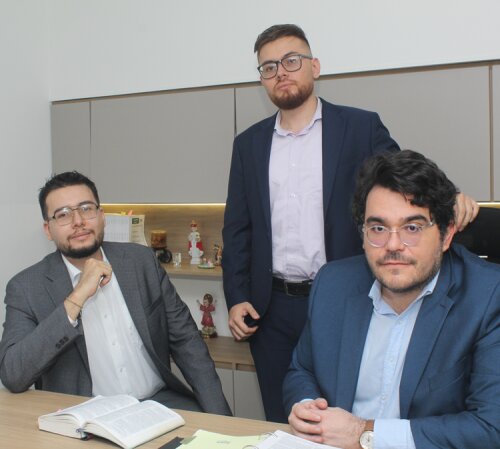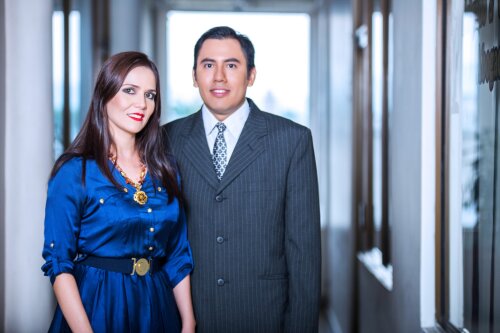Best Faith-Based Law Lawyers in Bucaramanga
Share your needs with us, get contacted by law firms.
Free. Takes 2 min.
List of the best lawyers in Bucaramanga, Colombia
About Faith-Based Law in Bucaramanga, Colombia
Faith-Based Law in Bucaramanga, Colombia refers to the legal matters and principles that affect religious organizations, religious expression, and the interaction between religion and Colombian law. Colombia is a secular country, but it recognizes freedom of religion and the legal existence of various religious denominations. Faith-Based Law covers issues such as the formation and governance of religious entities, religious marriages and their recognition, property ownership by religious organizations, and the rights and obligations of both individuals and groups in practicing their faith.
Why You May Need a Lawyer
There are several common situations where legal assistance in Faith-Based Law may be needed in Bucaramanga:
- Registering a religious organization with the Ministry of Interior or local authorities
- Understanding the legal status and obligations of a church, mosque, temple, or other religious community
- Resolving disputes within a religious community or between a religious organization and third parties
- Handling property transactions or donations involving religious entities
- Seeking recognition of religious marriages or ceremonies under Colombian civil law
- Protecting freedom of religious expression in employment, education, or public settings
- Responding to allegations of discrimination or violations of religious rights
- Compliance with tax laws and exemption statuses for religious groups
- Advising on the legal implications of religious activities, events, or publications
Local Laws Overview
In Bucaramanga, as in the rest of Colombia, the Constitution guarantees freedom of religion and worship. Religious groups may obtain legal recognition, which allows them to own property, operate schools, and conduct religious ceremonies. The Ministry of the Interior is the main governmental body in charge of registering religious entities and protecting religious freedom.
Key points include:
- Religious associations must be registered to gain legal personality
- Registered faith-based organizations may enter into contracts, possess assets, and receive donations
- Religious marriages may be recognized by the state if all legal requirements are met
- There are specific regulations regarding religious symbols and practices in public institutions
- Laws prohibit discrimination based on religion in employment, education, and public life
- Tax exemptions may apply to legally recognized religious communities
Frequently Asked Questions
What is the process for registering a church or religious entity in Bucaramanga?
You must present documentation outlining the entity's statutes, founding members, and governance structure to the Ministry of the Interior. Upon approval, your organization receives legal recognition.
Are religious marriages automatically recognized by the Colombian state?
Only if the marriage complies with both the religious requirements and the legal criteria set by Colombian law. Documentation must be formalized with the local civil registry office.
Can religious organizations own property in their name?
Yes, registered religious organizations can lawfully own, buy, sell, and manage property in Colombia, including Bucaramanga.
Do religious entities pay taxes in Colombia?
Certain tax exemptions are available for recognized religious groups, particularly regarding their religious and charitable activities. However, commercial activities may be taxed.
What are the rights of individuals regarding religious expression at work or school?
Colombian law prohibits discrimination based on religion. Employers and educational institutions generally must respect reasonable expressions of faith, unless they conflict with essential duties or public safety.
Can a foreign religious group establish itself in Bucaramanga?
Yes, but they must comply with the same registration and legal requirements as Colombian religious organizations.
How can a religious group resolve internal disputes legally?
Disputes are often first addressed internally, but may be brought before Colombia's civil courts if necessary. Legal statutes and the organization’s governing documents will guide these processes.
Is street preaching or public religious events permitted?
Freedom of religious expression is protected, but public events may require permits from local authorities and must not disrupt public order or violate existing laws.
How can someone report religious discrimination in Bucaramanga?
Complaints can be filed with the Ministry of the Interior, Defensoría del Pueblo (Ombudsman), or local human rights offices.
Do religious schools have special legal requirements?
Yes, religious schools must adhere to Colombian educational standards, but may include religious curriculum and practices, provided these align with constitutional rights and regulations.
Additional Resources
Here are some helpful resources and organizations for those seeking guidance in Faith-Based Law in Bucaramanga:
- Ministry of the Interior - Office for Religious Affairs (Ministerio del Interior - Dirección de Asuntos Religiosos)
- Defensoría del Pueblo (Colombian Ombudsman) for human rights issues, including religious freedom
- Concejo Interreligioso de Colombia (Interfaith Council of Colombia) for interfaith dialogue and legal guidance
- Local legal aid clinics or university law faculties with expertise in constitutional and religious law
- Bucaramanga city government offices for permits and registry information
Next Steps
If you need legal assistance regarding Faith-Based Law in Bucaramanga, it is advisable to:
- First, clearly define your legal question or concern
- Collect all relevant documentation about your religious group, property, or issue
- Contact a lawyer experienced in Faith-Based Law or constitutional law in Colombia
- Reach out to the Ministry of the Interior or local authorities for guidance on registration or compliance questions
- Consider mediation or legal counseling before proceeding to litigation, especially for internal community matters
- Stay informed about local and national laws affecting religious practice and organization
A knowledgeable local attorney can guide you through every step, help resolve disputes, and ensure your organization or your rights are correctly protected under Colombian law.
Lawzana helps you find the best lawyers and law firms in Bucaramanga through a curated and pre-screened list of qualified legal professionals. Our platform offers rankings and detailed profiles of attorneys and law firms, allowing you to compare based on practice areas, including Faith-Based Law, experience, and client feedback.
Each profile includes a description of the firm's areas of practice, client reviews, team members and partners, year of establishment, spoken languages, office locations, contact information, social media presence, and any published articles or resources. Most firms on our platform speak English and are experienced in both local and international legal matters.
Get a quote from top-rated law firms in Bucaramanga, Colombia — quickly, securely, and without unnecessary hassle.
Disclaimer:
The information provided on this page is for general informational purposes only and does not constitute legal advice. While we strive to ensure the accuracy and relevance of the content, legal information may change over time, and interpretations of the law can vary. You should always consult with a qualified legal professional for advice specific to your situation.
We disclaim all liability for actions taken or not taken based on the content of this page. If you believe any information is incorrect or outdated, please contact us, and we will review and update it where appropriate.












